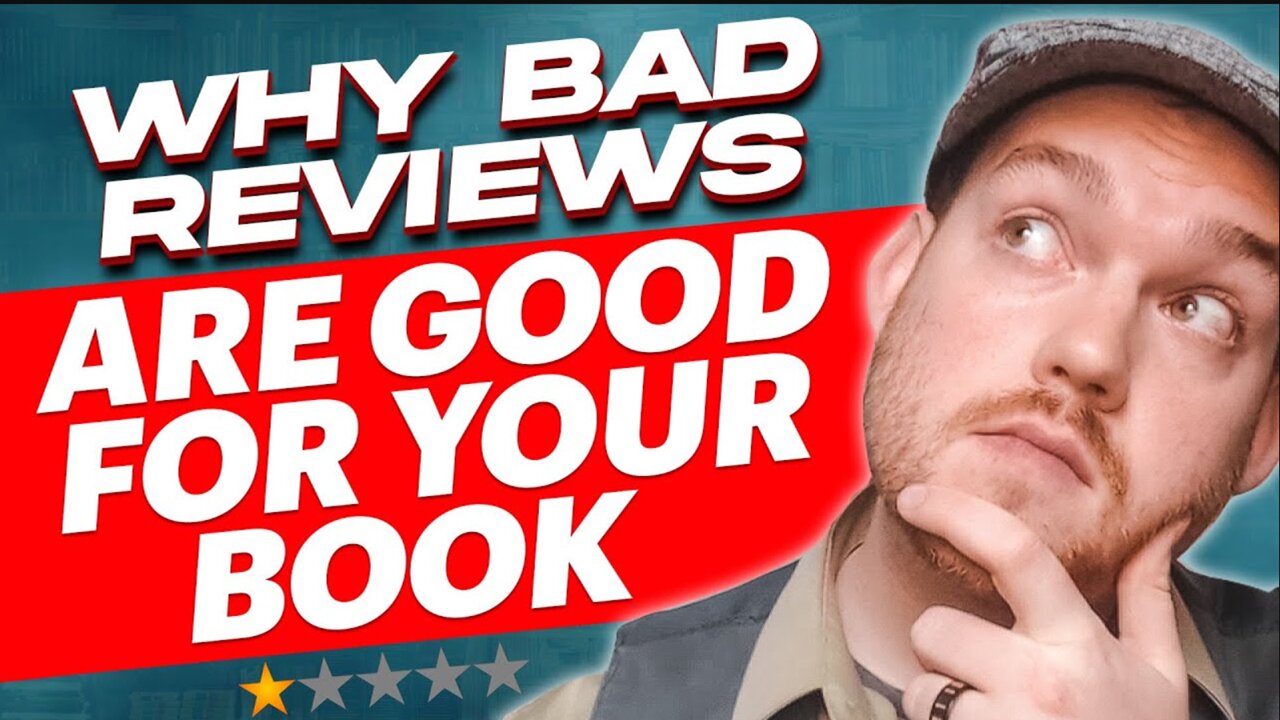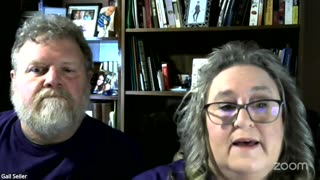Premium Only Content

Promote Your Book on Amazon with BAD Reviews w/ Celebrity Ghostwriter and Writing Coach Joshua Lisec
👉 Write a useful book that converts readers into high-paying clients. Free training shows you how: https://lisecghostwriting.com/golden/ 📖
Bad book reviews might sound like an author’s nightmare—but in reality, they can become one of the most powerful assets in a writer’s book marketing toolkit. In the new video, “Promote Your Book on Amazon with BAD Reviews w/ Celebrity Ghostwriter and Writing Coach Joshua Lisec,” bestselling author and celebrity ghostwriter Joshua Lisec reveals why bad book reviews can actually boost credibility, visibility, and sales. This episode of The Entrepreneur’s Wordsmith Show turns a common fear into a strategic advantage for authors, experts, and entrepreneurs ready to grow their influence.
Drawing from his experience as a certified ghostwriter with over 35 books to his name, including multiple international bestsellers, Lisec explores why the occasional negative review isn’t something to dread—it’s something to leverage. Using examples from real-world publishing data, marketing research, and even case studies featuring Mike Cernovich, he demonstrates that bad book reviews don’t have to hurt a book’s reputation. In fact, they can strengthen it.
In this bad book reviews video, Lisec explains that readers today are more skeptical than ever. When a book has only glowing five-star ratings, people often suspect those reviews are fake, filtered, or manipulated. Research cited in The Guardian shows that products with only perfect reviews are viewed with distrust by 95% of potential customers. This is why book reviews examples that show a mix of praise and criticism make a title appear more authentic.
Negative reviews, as Lisec explains, build trust—and trust sells.
For anyone looking for book marketing tips or learning how to promote a book for free, this video provides a fresh, data-backed perspective. Lisec highlights a landmark study from Northwestern University’s Spiegel Research Center, which found that products with an average rating between 4.2 and 4.5 stars generate the highest sales. Books with a few bad book reviews, therefore, often outperform those with flawless scores.
Lisec—known for his mastery of persuasive writing and his one-of-a-kind method for capturing an author’s true voice—translates this insight into practical steps any author can take. He teaches viewers how to respond to criticism constructively, how to use a negative review response example to strengthen their author platform, and why engaging professionally with readers enhances visibility on platforms like Amazon.
He reminds viewers that even major authors like Simon Sinek have hundreds of bad book reviews, and it hasn’t slowed their success. Instead, such reviews serve as social proof: evidence that the book is real, widely read, and thought-provoking enough to spark discussion. As Lisec emphasizes, controversy can be persuasive. When an author takes a stand—when their ideas challenge assumptions—some readers will love it, and others won’t. But that polarity fuels engagement, and engagement drives sales.
Lisec also delves into the concept of positioning through opposition. Drawing on insights from successful authors and bloggers, including Cernovich, he explains that truly persuasive authors embrace disagreement. If everyone agrees with your book, Lisec says, you probably haven’t said anything worth debating. When a book provokes strong reactions—both positive and negative—it captures attention and compels people to read it for themselves.
This episode also addresses one of the most overlooked yet talked-about aspects of self-publishing: book typos and mistakes in published books. Lisec provides examples of how even successful books contain errors, and yet those “imperfections” rarely harm performance. In fact, they can humanize the author and even increase reader interaction. Typos cause readers to pause, re-read, and mentally engage with the content. According to persuasion experts, this momentary disruption strengthens cognitive investment—making readers process the message more deeply.
In discussing book tip and book promotion tips, Lisec refers to Cernovich, author of Gorilla Mindset, who sold over 100,000 copies despite critics pointing out typos in the early chapters. Rather than derailing his success, those bad book reviews and mistakes in published books created curiosity and conversation—proof that perfection isn’t required to profit from publishing.
Lisec reminds viewers that even professionally edited works will contain the occasional slip, no matter how many proofreaders are involved. Typos and minor imperfections are a fact of life, not a failure. The key is to focus on persuasion, positioning, and marketing—the true engines of a book’s longevity.
As a writing coach, Lisec walks viewers through the psychological shift that separates amateurs from professionals. Instead of fearing negative feedback, professional authors study it, learn from it, and sometimes even use it as marketing fuel. He provides negative reviews examples that demonstrate how authors can craft thoughtful, confident responses to criticism, turning detractors into curious onlookers—or even future readers.
Lisec’s central message throughout the bad book reviews video is clear: responding to a negative review isn’t about defending your ego—it’s about defending your message. A calm, intelligent response shows integrity, reinforces credibility, and demonstrates leadership. When readers see an author handle feedback with grace, it only strengthens their trust and admiration.
The episode ties back to Lisec’s signature philosophy of persuasive writing. Every review—good or bad—is an opportunity to persuade. Every comment section is an arena for authentic connection. By embracing imperfection and conflict, authors can transform potential setbacks into storylines that enhance their brand.
For writers wondering how to promote your book on Amazon, Lisec delivers actionable insights:
• Use book reviews examples in marketing materials to highlight reader engagement.
• Share a negative review response example on social media to show professionalism and confidence.
• Incorporate book marketing tips that emphasize transparency over perfection.
• Learn how to promote a book for free by leveraging Amazon’s algorithm, which rewards activity—including review discussions and ratings variety.
The episode concludes with Lisec offering authors a way to measure their potential book success before even publishing. He introduces his Book Revenue Calculator, an innovative tool that estimates the return on investment from writing and launching a book. This ties back to his broader mission as a celebrity ghostwriter—helping authors not just write great books, but write profitable ones.
Lisec’s decades of experience shine through every minute of the video. He’s not just teaching how to handle criticism—he’s teaching how to think like a market-savvy professional. For anyone looking to navigate negative reviews, master book promotion tips, or learn how to promote your book on Amazon, this episode is a must-watch.
Whether a viewer is working on their first manuscript or marketing their tenth, Lisec’s guidance offers a refreshing mindset shift. The fear of bad book reviews turns into fuel for authenticity, conversation, and connection. The irritation over book typos becomes a lesson in reader psychology. And the sting of a one-star rating? That becomes proof that people are paying attention.
Ultimately, Lisec proves that bad reviews aren’t bad for business—they’re proof you’re in business. The presence of critics shows that your message matters. And when your writing is anchored in persuasive writing principles, even your harshest reviewers can end up driving new readers your way.
For authors ready to embrace both the praise and the pushback, The Entrepreneur’s Wordsmith Show offers the tools, mindset, and strategies to thrive. In this powerful episode, Joshua Lisec reminds every author that success isn’t about pleasing everyone—it’s about persuading the right people. And sometimes, that means welcoming a few bad reviews along the way.
-
 26:09
26:09
Exploring With Nug
10 hours ago13 Cold Cases in New Orleans What We Discovered Beneath the Surface!
3373 -
 27:39
27:39
MYLUNCHBREAK CHANNEL PAGE
5 hours agoDestroying Time.
82.1K5 -
 LIVE
LIVE
SavageJayGatsby
35 minutes ago🔥🌶️ Spicy Saturday – BITE Edition! 🌶️🔥
45 watching -
 2:14:31
2:14:31
Side Scrollers Podcast
5 hours agoSide Scrollers INVITE ONLY - Live From Dreamhack
124K7 -
 1:18:23
1:18:23
Simply Bitcoin
2 days ago $11.83 earnedThe Bitcoin Crucible w/ Alex Stanczyk and Lawrence Lepard
16.6K4 -
 1:25:03
1:25:03
Jeff Ahern
5 hours ago $16.99 earnedThe Saturday Show with Jeff Ahern
66.8K8 -
 1:31:56
1:31:56
Michael Franzese
20 hours agoWill NBA do anything about their Gambling Problems?
127K26 -
 57:26
57:26
X22 Report
10 hours agoMr & Mrs X - The Food Industry Is Trying To Pull A Fast One On RFK Jr (MAHA), This Will Fail - EP 14
99.5K66 -
 2:01:08
2:01:08
LFA TV
1 day agoTHE RUMBLE RUNDOWN LIVE @9AM EST
157K15 -
 1:28:14
1:28:14
On Call with Dr. Mary Talley Bowden
8 hours agoI came for my wife.
33.2K34